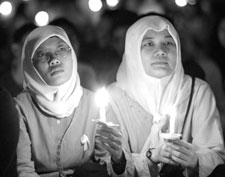
JAKARTA (IPS)–Salim Umar, a Muslim preacher in Bandung, says the Bali bombings are “not a religious matter at all,” so he did not discuss them at the mosque at Friday prayers.
Rather than have the “politically-colored” Bali bombing take center stage, he says the discussions in many mosques focused on preparations for the holy month of Ramadan, the Muslim month of fasting that this year starts in November.
“Besides, our congregation members are not excited in listening to that issue,” he says. “People tend to point fingers at each other in search of the culprits. We don’t want to engage in that.”
Asep Saeful Muhtadi of Pusat Dakwah Indonesia (Center for Indonesian Preaching), is aware that some foreign countries and international institutions have accused Muslim radicals of plotting the Oct. 12 attacks that killed nearly 200 people, mostly Australians.
This, he says, upsets him and many other Muslims in this country of 220 million people, 85 percent of whom are Muslims.
“First, we are taught not to be prejudiced against anyone, or any party, if evidence is not there,” Mr. Muhtadi says.
He was referring to accusations made by Indonesian officials that al-Qaeda was behind the attack, without citing evidence so far, and then by speculations that it might be the Jemaah Islamiyah, which seeks the establishment of a pan-Islamic state in South-east Asia.
“Second, even if the radicals are found to be behind the incident, they do not represent Indonesian Muslims,” Mr. Muhtadi points out.
He points that Indonesia, the world’s most populous Muslim country, has two of the largest organizations–the Nahdlatul Ulama with 40 million members and Muhammadiyah with 30 million.
“These groups have nothing to do with the terrorist activities. So foreign countries have no reason to accuse Indonesian Muslims,” he says.
Indonesian police recently arrested 64-year-old Abu Bakar Ba’asyir, leader of an Islamic boarding school in East Java and supposed leader of Jemaah Islamiyah, for being involved in a series of bomb attacks in South-east Asia and a plot to assassinate Indonesian President Megawati Sukarnoputri last year.
Police have also arrested a second man, Habib Rizieq, leader of the Islam Defenders Front, on similar charges.
However, Indonesian authorities said that Mr. Ba’asyir’s arrest does not mean he will be put in jail or that he is a suspect in the Bali bombings.
Indonesia had been under pressure to take in Mr. Ba’asyir even before the Bali attacks. Mr. Ba’asyir is accused by the United States of involvement with Omar al-Faruq, an alleged al-Qaeda operative who was arrested in Jakarta in June, but later handed over to the U.S. authorities.
Evidence given by Mr. al-Faruq points the finger at Jemaah Islamiyah’s responsibility for various bomb plots in South-east Asia since Sept. 11 last year.
Few Indonesians doubt that the arrest of Mr. Ba’asyir and Habib Rizieq comes in response to mounting pressure from the United States, Australia and Britain to crack down on extremist groups inside Indonesia.
“We all know the police is under pressure by foreign countries to catch him (Ba’asyir). We all know our police have no capability to investigate even small bomb attacks in Jakarta,” Mr. Muhtadi said.
Besides, he argues, even months ago local news reports have been saying that the two were threats to the government, but they were only arrested now after foreign governments stepped in after the Bali attacks.
Others, like Muslim scholar Fachry Ali, go further, saying that the response by the Indonesian police to the Bali bomb blast is clearly biased because they had closed their eyes to earlier problems.
“People around the bomb blast site know that the night spots have been imposing racial services,” he says, referring to their practice of barring Indonesian guests into their premises.
“The Sari Club, Peanuts and Gowa discotheques have been acting racially for more than 10 years. They do not receive Indonesian guests in this very Indonesian country. It is bluntly against the law and the police are aware of it. But the police did not do anything about it,” he said.
A senior U.S. official warned late Oct. 18: “Indonesia is now very much at a crossroads” and has to demonstrate its determination to pursue suspected terrorists or risk the consequences.
That same day, Mr. Megawati signed an emergency decree that gives the Indonesian police powers to hold suspected terrorists for up to a week without charges, and to extend the detention period based on intelligence information.
Anyone who commits, or threatens to commit, an act of terror faces sentences that include life in prison or death by firing squad.
The new decree has been accepted by the big Muslim organizations, although Masduki Baidlowi, deputy secretary general of the Nahdlatul Ulama, says the authorities should also be careful not to abuse the regulations and must only act on hard evidence.
Syafii Maarif, chairman of Muhammadiyah, dismissed concerns that the regulations would be used to arrest Muslims who take a more hard line approach in their beliefs.
Even before the Bali attacks, Indonesia had been under international pressure to act against groups linked by foreign intelligence agencies to terrorism, but the government has been treading carefully in order to avoid a backlash.
Indonesia’s Muslims are known to be mostly moderate, but many fear that the U.S.-led “war on terror” could be used to attack Islam in general and to undermine rights concerns.
“I still remember, in the past western countries strongly criticized Malaysia for being authoritarian for its brand of anti-terrorist regulation,” says Moeflich Hasbullah, a senior lecturer at the Bandung-based State Islamic University.
“They said it was against people’s human rights. But now they hail the regulation and encourage Indonesia to do the same thing. So human rights can change, depending on (western) interests,” he says.












